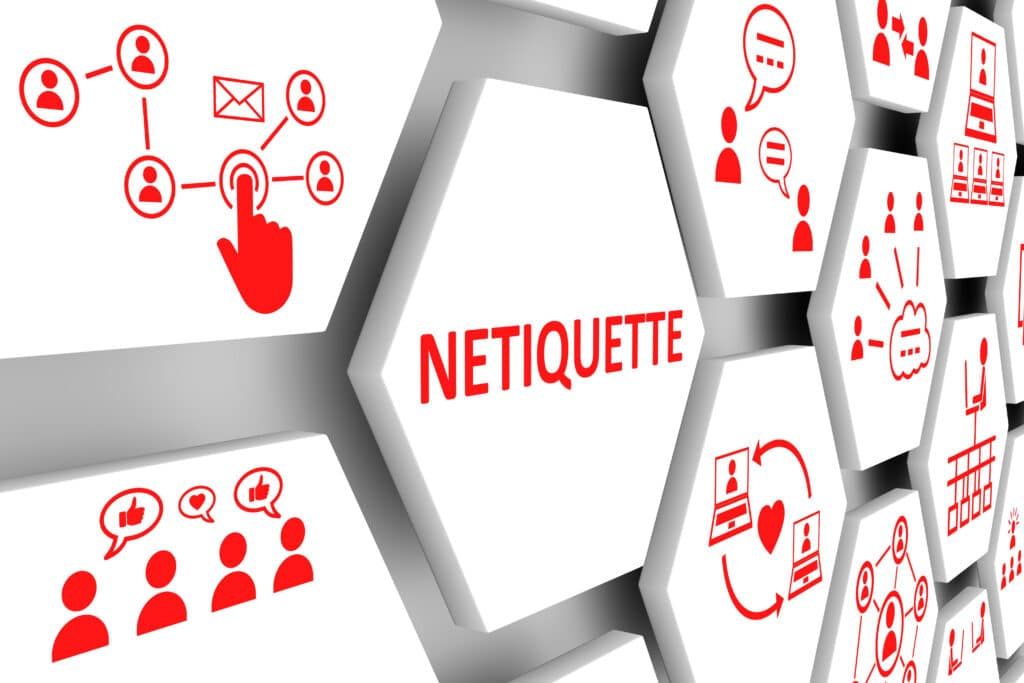To which sites does it apply?
Netiquette is a concept that emerged with the advent of Web 2.0. This evolution translates into the possibility of interacting with other people, instead of only accessing information. However, screens can make some users more disrespectful, aggressive and reckless.
Netiquette is used to remind Internet users of the rules that are common sense and the law.
Netiquette applies to which websites ?
All the actors of the Web are supposed to take care of theapplication of the netiquette. Thus, these rules concern both blogs and specialized sites such as betFIRST. It is basically the principles of good manners for chatting online.
The neologism comes from the contraction of the terms "net" and "label". In addition to the respect of others, netiquette can have a legal scope in some cases (hate speech, incitement to terrorism, child pornography content…).
Online etiquette is essentially the explicit or unwritten rules applicable within a community. Users are, for example, expected to respect basic etiquette during their online interactions. However, these principles are not legally binding and do not always lead to sanctions.
They are only a basic charter of good conduct.
Apart from politeness, the rules of netiquette can vary significantly depending on the sites considered. Each platform can nevertheless indicate the prohibitions and associated penalties in the general conditions of use. In case of non-compliance, offenders risk the deletion of their publications or the loss of certain privileges (badges, titles, winnings in a game, etc.).).
They can also be temporarily or permanently banned.
It is up to the moderators or administrators to enforce netiquette on a given platform. These rules can be applied to forums, member spaces, online comments, groups on social networks… In any case, all sites must monitor the comments published, the content broadcast and the links shared by their communities. They will be able to protect themselves from legal actions due to illicit content on their platforms.
What do they risk if they do not respect it ?
Beyond the rules of propriety, theapplication of netiquette implies the respect of certain legal principles such as intellectual property. Copyright is indeed an integral part of the netiquette. Any violation is punishable by a fine of 300,000 euros and a prison sentence of 3 years.
The penalty can be applied to the offender or to the website hosting the content concerned.
As a general rule, Internet users are difficult to identify formally. Many people use tools like VPNs to be anonymous online. Therefore, it is the responsibility of the web actors to enforce copyright on their platforms.
The site will then be considered as the offender, if it has not taken measures to avoid or solve the problem.
Other sanctions may also be applied depending on the laws and regulations requiring the application of netiquette. In case of serious violations, authorities may permanently shut down the platform and the associated company. The State can possibly to block the site on the French territory, if the operators are outside its jurisdiction. Depending on the situation, the person in charge of a website can also be sanctioned for :
- Public defamation (12,000 to 45,000 euros fine and 1 year in prison);
- Disclosure of confidential data (15,000 euros and 1 year in prison) ;
- Non-respect of privacy (45,000 euros fine and 1 year in prison) ;
- Public incitement to hatred, discrimination and violence (45 000 euros fine and 10 years imprisonment) ;
- Online child pornography (75,000 euro fine and 5 years in prison);
- Offense against the security of the State or incitement to arm against the public authorities (75 000 euros to 450 000 euros fine and 5 years imprisonment);
- Apology for terrorism and extremism or provocation to carry out terrorist acts (100,000 euros fine and 7 years imprisonment).
To avoid any complication, the sites must Keeping control over content sharing and discussion threads. Moderators are thus essential on platforms that allow the exchange of words, links and media files.
